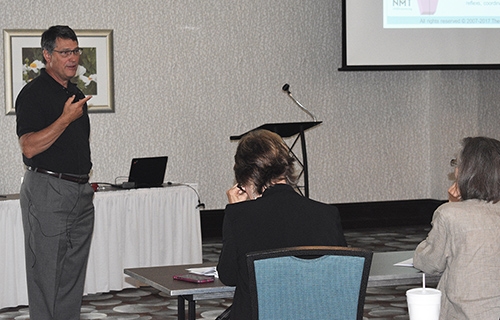Information from the keynote speaker at this year's U of A conference on play therapy expanded participants' knowledge of neuroscience while validating the importance of play therapy techniques.
Richard Gaskill, who directs the Sumner Mental Health Center in Wellington, Kansas, spent two days in June teaching licensed counselors and counseling students the importance of understanding brain development in children during the treatment process. The U of A Office of Play Therapy Research and Training presented the conference. Professionals earned 12 continuing education credits for attending.
"Dr. Gaskill taught us about recognizing at what stage of brain development children have experienced trauma," said Danielle Raubuck, a graduate of the U of A counselor education program who practices locally. "Without treating trauma at its most basic level and understanding that children need safety and love, without treating that part there is no possibility of ever getting to talk therapy."
Understanding the neuroscience of a child's developing brain makes play therapy an even more powerful tool, Raubuck said.
Gaskill was a founding member and past present of the Kansas Association for Play Therapy. He serves as the chair of the Board of Directors of the national Association for Play Therapy as well as a reviewer for the International Journal of Play Therapy. His presentations met the following objectives for participants to:
- Learn key neurobiological concepts vital to growth and development
- Identify important developmental activities that impact specific brain regions
- Integrate developmentally appropriate activities into daily activities and intervention design
- List functional neurobiological indicators of children suffering from social-emotional maltreatment
- Assess the functional disorganization in traumatized children
- Create play and play therapy intervention techniques that are appropriate for specific functional social-emotional issues
Kristi Perryman, assistant professor of counselor education and a registered play therapist-supervisor, created and directs the Office of Play Therapy Research and Training. The national Association for Play Therapy granted designation to the U of A office as an approved center in March of 2015.
The U of A offers both master's and doctoral degrees in counseling. The Master of Science degree offers specialties in clinical mental health counseling and school counseling. Both degree programs are accredited by the Council for the Accreditation of Counseling and Related Educational Programs. Raubuck is working on completing the certification process to become a registered play therapist through the university's program.
Julia Conroy, a student in the counseling master's program, learned about play therapy after coming to the U of A and took Perryman's introductory class.
"I'm interested in working with kids and obviously the way they process emotions and events in lives," she said. "We need to adopt a different approach to them than when working with adults."
She said she was excited about the conference to really deepen her knowledge of the neurocognitive issues that affect play therapy, which may have a connotation for parents that the counselor merely plays with the child. Play is a child's first language and, just as adults use words to communicate, children use play to express thoughts and feelings that might otherwise remain hidden.
"Now, I can better explain play therapy to parents," Conroy said. "I learned the terminology and gained a much better understanding of what is going on cognitively with children during play therapy. There is a neuro-sequential order to abilities and tasks, and you have to build a foundation. You can't fast forward."
Conroy and Raubuck said the conference was a great opportunity to talk with clinicians and learn how they are applying play therapy concepts. Conroy said the conference would be beneficial to people in many fields because of the emphasis on how the mind and body interact and the fact that issues in adults can be traced back to events that affected their brain development as children.
"It's powerful to focus on the basic needs that unify the human experience," she said. "We see some of the same themes in regard to all of our clients, regardless of their socioeconomic status, gender, or age."
Raubuck said the information and networking were refreshing.
"I am thankful to Dr. Perryman for bringing incredible speakers to us here at home," Raubuck said. "We can get exposure to everything going on in field. She makes it very easy to do that."
Next year's play therapy conference is set for June 21 and 22. It features Bonnie Badenoch, Ph.D., author of Being a Brain-Wise Therapist: A Practical Guide to Interpersonal Neurobiology and The Heart of Trauma: Helping the Embodied Brain in the Context of Relationships.
About the College of Education and Health Professions: The College of Education and Health Professions offers advanced academic degrees as well as professional development opportunities and learning communities in service to the education and health systems of Arkansas and beyond. The college provides the education and experiences for a range of professional roles, ranging from community mental health counselors to school teachers and leaders. Programs in adult and higher education, along with educational technology and sport management, and human resource and workforce development, offer a broad range of options. In addition to education-related opportunities, the college prepares nurses, speech-language pathologists, health educators and administrators, recreation professionals, rehabilitation counselors and human performance researchers.
Topics
Contacts
Heidi S. Wells, director of communications
College of Education and Health Professions
479-575-3138, heidisw@uark.edu
